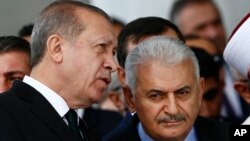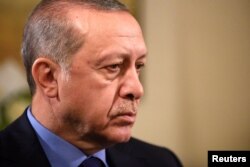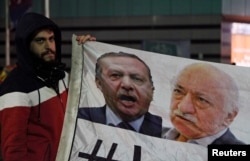Turkish Prime Minister Binali Yildirim heads to Washington Tuesday to meet with U.S. Vice President Mike Pence, as relations between the NATO allies endure a rocky period.
"Prime Minister Yildirim's visit is being paid in a very critical time with regard to Turkish American relations,” said a senior Turkish presidential adviser speaking on condition of anonymity. “It can be a great opportunity to catch a new momentum.”
“The very fact the [Turkish] prime minister is almost going impromptu to Washington suggests there are a series of serious crises between Turkey and the United States,” said international relations expert Soli Ozel of Istanbul’s Kadir Has University. “Obviously, this is coming to a crossroads and the key date is there, 27th of November when the Zarrab trial is supposed to start.”
Turkish-Iranian businessman Reza Zarrab and Mehmet Atilla, the deputy chief executive of the Turkish state bank Halkbank, are facing trial on Iranian sanctions violation charges in a New York court. A former senior Turkish minister, Zafer Caglayan, closely linked to Turkish President Recep Tayyip Erdogan, has also been indicted in the case.
Erdogan has criticized the probe as politically motivated. According to reports, he lobbied hard for Washington to drop the charges. The issue is expected to top Yildirim’s agenda in talks with Pence.
“There is a different perception, fundamental seminal difference in perceiving what the law is,” noted political analyst Semih Idiz.
He warned that Washington’s claims about the independence of the judiciary are unlikely to assuage Ankara’s concerns. “Erdogan says openly that he believes there is this massive conspiracy against him and America is part of it.”
Gulen extradition
Additionally, Yildirim is expected to raise Ankara's ongoing attempts to secure the extradition of Turkish cleric Fethullah Gulen, who lives in self-imposed exile in Pennsylvania. Turkish prosecutors accuse Gulen of masterminding last year’s attempted coup, a charge the cleric denies.
Erdogan says the lack of progress in the case is politically motivated. Washington counters it's a matter for the courts. But Ankara views recent cooperation between the U.S. Department of Homeland Security and Turkish prosecutors to track the movement of a suspect in the failed coup as significant. "The U.S. is making considerable progress in this regard,” said Erdogan’s adviser.
The dispute has fueled suspicions in Ankara of Washington’s complicity in the failed coup, a charge the United States strongly rejects. Last month, Turkish prosecutors detained a local employee at a U.S. diplomatic mission in Turkey as part of its Gulen investigation. The detention prompted Washington to impose stringent visa controls on Turkey. Ankara retaliated with similar measures.
Pence is expected to raise the issue of the arrest of U.S. citizen Andrew Brunson, who has been in a Turkish jail without charge for more than a year as part of the ongoing Gulen probe.
"During [Turkish] prime minister's visit, we expect the visa crisis will be ended between the two allies,” said the Turkish presidential adviser.
Repairing the damage
"The big question is can Mr. Yildirim, on a trip that will last four days, be able to actually repair much of the damage inflicted on this relationship?" said Ozel. "I think it will be very difficult, unless there is some progress on at least one of the issues of contention.”
Potentially more difficult to resolve for Yildirim is the thorny issue of Washington’s arming of the Syrian Kurdish militia, the YPG, in the war against Islamic State. Ankara accuses the militia of being affiliated with the Kurdistan Workers Party, or PKK, which the Turkish army has been fighting for decades. The United States and the European Union have designated the PKK as a terrorist organization.
Yildirim is likely to face difficult questions during his talks in Washington. Turkey’s NATO partners are voicing growing concern over Ankara's warming relationship with Moscow, underlined by last month’s announcement it planned a multi-billion-dollar purchase of Russia’s S 400 missile system.
Analysts suggest both sides still have interests in containing the escalating tensions.
“This is way past a storm in a tea cup; this is a real storm, but there are still strategic interests that either side can't throw away; if there weren't strategic interests, then we would go for some kind of a break up,” predicted columnist Idiz.
Analysts also say Washington will be aware Turkey could play a key role in efforts to stem Iran's growing power in the region.
For Ankara, there is the risk of increasing diplomatic isolation, given its strained ties with many of its allies. They suggest both sides will likely try to present a veneer of success to Yildirim's Washington visit, even if there is no breakthrough.
Despite this, there were signs that diplomatic tensions between the two countries were beginning to ease. On the eve of the Turkish official's visit to Washington, the U.S. Embassy in Ankara announced U.S. consular services in Turkey would resume processing some visa applications. U.S. missions in Turkey suspended the processing of all non-immigrant visas a month ago, after Turkish authorities arrested a local employee of the U.S. Consulate in Istanbul in the wake of last year's failed coup attempt. The employee was held on charges of spying and allegedly having links to Gulen.
In a statement, U.S. Embassy officials said the United States has received "high-level assurances" from the government of Turkey that no other staff of the U.S. missions in Turkey are under investigation or due for arrest. The statement said the Turkish government has agreed to give advance notice if it intends to arrest or detain mission employees in the future.







